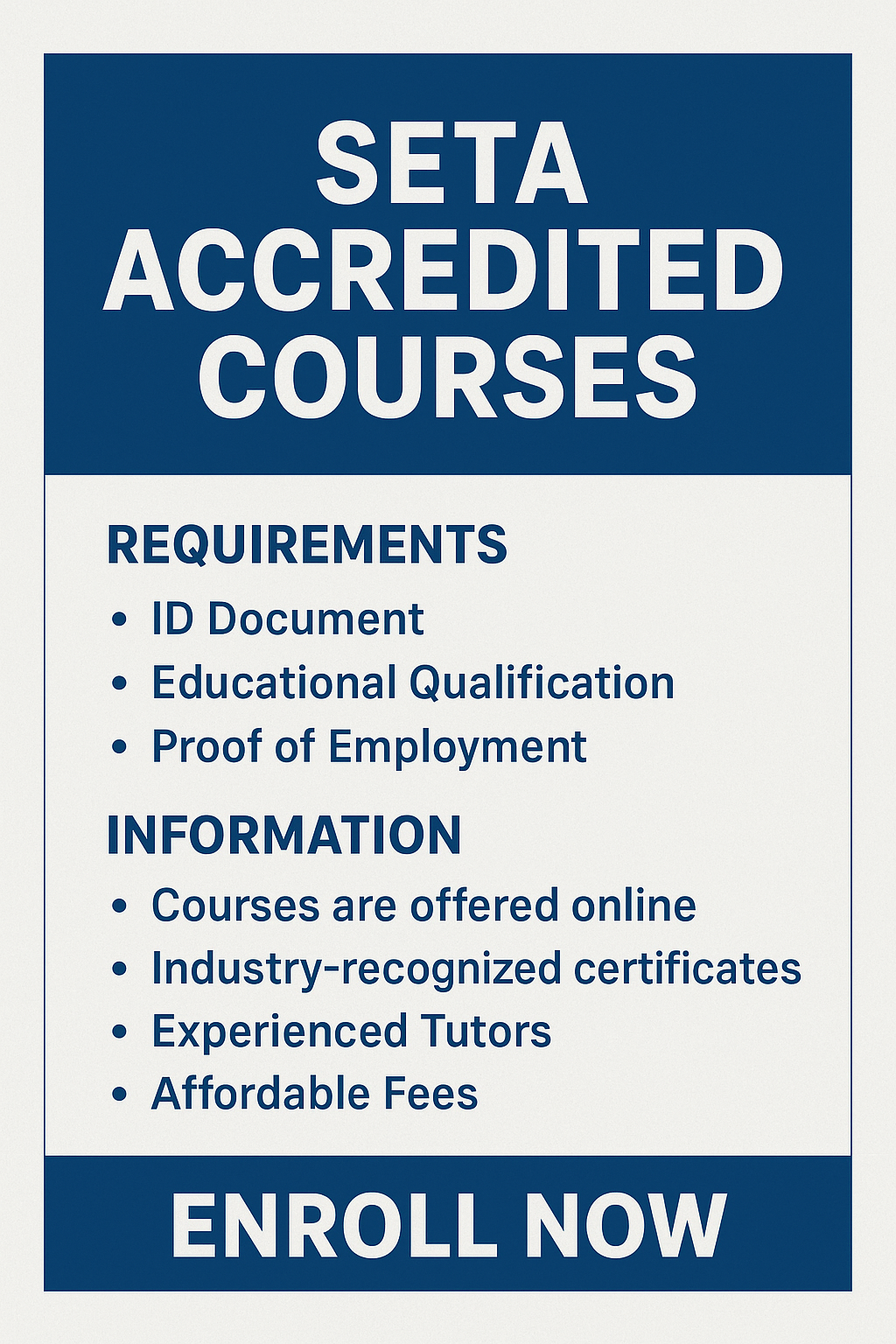Skills development has become one of the most important drivers of economic growth and employability in South Africa. With high levels of unemployment, especially among the youth, there is a pressing need for training opportunities that prepare individuals for the demands of the job market. This is where the Sector Education and Training Authorities (SETAs) come in. SETAs play a vital role in skills development by funding training programmes, accrediting qualifications, and ensuring that education aligns with the needs of different industries.
In this article, we will explore what SETA skills development means, how it works, why it matters, and how learners, employers, and communities can benefit from it.
What is SETA Skills Development?
SETA stands for Sector Education and Training Authority. There are currently 21 different SETAs in South Africa, each focusing on a specific sector of the economy, such as construction, transport, agriculture, finance, and health.
Skills development through SETAs involves:
- Identifying skills shortages in different industries.
- Providing accredited training programmes.
- Funding learnerships, internships, bursaries, and apprenticeships.
- Supporting employers with workplace skills plans.
- Helping unemployed individuals gain qualifications and workplace exposure.
The ultimate goal of SETA skills development is to bridge the gap between education and the real needs of the economy.
Why Skills Development is Important
- Reducing Unemployment
South Africa faces a high unemployment rate. By equipping people with practical skills, SETAs help individuals become employable and productive. - Economic Growth
Skilled workers improve productivity, which contributes to economic stability and competitiveness. - Empowerment of Youth
Many learnerships and training opportunities are targeted at young people, giving them a better chance to build sustainable careers. - Bridging the Skills Gap
SETAs identify critical and scarce skills in industries and ensure training is available to meet those needs. - Accredited Training
All SETA programmes are nationally recognized, meaning learners can use their qualifications to pursue further studies or career opportunities.
The Role of SETAs in Skills Development
SETA skills development functions within the National Skills Development Strategy (NSDS) framework, which aims to transform the education and training system. Some key roles include:
- Facilitating Learnerships and Internships: Offering structured programmes that combine theoretical training with practical workplace experience.
- Accrediting Training Providers: Ensuring institutions meet national standards.
- Managing Grants and Funding: Employers who contribute to the Skills Development Levy can apply for grants to train employees.
- Promoting Lifelong Learning: Encouraging continuous skills improvement for employed and unemployed individuals.
Types of SETA Skills Development Programmes
SETAs offer a wide range of programmes for both employed and unemployed people. These include:
1. Learnerships
- A combination of theoretical training and practical experience.
- Learners sign a contract with an employer and training provider.
- Leads to an accredited qualification.
- Example: A hospitality learnership for unemployed youth to become chefs or hotel managers.
2. Internships
- Work experience for graduates or learners who have completed theoretical studies.
- Helps participants apply classroom knowledge in real workplace settings.
3. Apprenticeships
- Technical training in trades such as plumbing, welding, and electrical work.
- Prepares learners for artisan careers that are in high demand.
4. Bursaries
- Financial support for learners who want to pursue formal studies in areas identified as scarce skills.
- Covers tuition, accommodation, books, and sometimes a stipend.
5. Skills Programmes
- Short, targeted training courses focusing on specific workplace skills.
- Ideal for people looking to improve or upgrade particular abilities.
Benefits of SETA Skills Development
For Learners
- Access to free or funded education.
- Nationally recognized qualifications.
- Work experience to improve employability.
- Monthly stipends for many programmes.
- Improved career opportunities.
For Employers
- Skills levy grants that reduce training costs.
- Improved staff productivity and performance.
- Opportunities to upskill employees.
- Contribution to corporate social responsibility.
- Alignment with BBBEE (Broad-Based Black Economic Empowerment) requirements.
For the Economy
- Reduced unemployment.
- Skilled workforce for sustainable development.
- Stronger industries and increased competitiveness.
- Improved socio-economic transformation.
How to Access SETA Skills Development Opportunities
Step 1: Identify Your Sector
Each SETA focuses on a specific industry. For example, the Construction SETA supports building-related skills, while the Services SETA covers fields like business, marketing, and management.
Step 2: Check Accredited Programmes
Visit the official SETA websites or contact accredited training providers to find available programmes.
Step 3: Prepare Your Documents
For most programmes, you will need:
- A certified copy of your ID.
- Highest qualification certificate.
- Proof of residence.
- Updated CV.
Step 4: Apply on Time
Keep track of closing dates for learnerships, internships, and bursaries. Late applications are usually not accepted.
Step 5: Be Ready for Assessments or Interviews
Some programmes require an interview, assessment test, or selection process before acceptance.
Skills Development Levy and Funding
Employers in South Africa are required by law to pay a Skills Development Levy (SDL) if their annual payroll exceeds R500,000. This levy goes into a national fund managed by SETAs to support training.
Employers who pay this levy can claim back a portion by:
- Submitting a Workplace Skills Plan (WSP).
- Reporting on their training activities through an Annual Training Report (ATR).
This system ensures continuous investment in workforce development.
Challenges Facing Skills Development
While SETA skills development has made a positive impact, there are challenges that still need to be addressed:
- Limited Awareness
Many people do not know about available opportunities or how to apply. - Matching Supply with Demand
Sometimes training programmes are not aligned with the actual needs of the job market. - Dropout Rates
Some learners struggle to complete programmes due to personal or financial reasons. - Administration Delays
Funding and accreditation processes can sometimes be slow. - Quality Concerns
Not all training providers deliver programmes at the same standard, which can affect the reputation of SETA qualifications.
Future of SETA Skills Development
The government continues to strengthen the SETA system through reforms and strategic planning. The future focus includes:
- Expanding digital and technology-related training.
- Increasing partnerships with private companies.
- Improving monitoring and evaluation of training programmes.
- Promoting entrepreneurship and self-employment opportunities.
- Addressing the shortage of artisans and technical workers.
These changes aim to make skills development more effective, accessible, and impactful.
Tips for Learners Applying for SETA Skills Development
- Start Early: Don’t wait until deadlines are near—applications require documents and preparation.
- Be Professional: Submit a neat CV and ensure your documents are certified.
- Stay Updated: Follow official SETA websites and local newspapers for opportunities.
- Take It Seriously: Once accepted, treat the programme like a real job. Punctuality and commitment matter.
- Think Long-Term: Use the opportunity to build a career, not just as a short-term solution.
Conclusion
SETA skills development is a powerful tool for reducing unemployment, empowering young people, and building a stronger South African economy. By offering accredited training opportunities, bursaries, learnerships, and apprenticeships, SETAs provide a bridge between education and the workplace.
For learners, it’s a chance to gain valuable skills and qualifications. For employers, it’s a way to build a skilled workforce while benefiting from grants. For the nation, it’s a strategy to foster growth, equality, and transformation.
If you are an unemployed individual, student, or employer, take advantage of what SETAs offer. Skills development is not just about training—it’s about unlocking potential and shaping a brighter future for South Africa.



